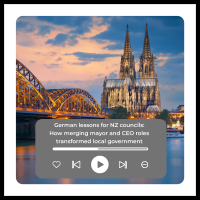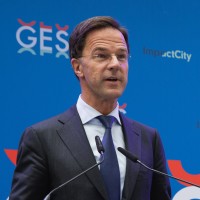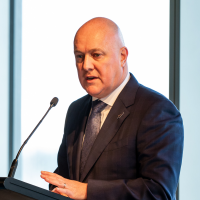
German solution for New Zealand’s local government woes
Wellington City Council’s recent turmoil highlights a widespread misunderstanding of New Zealand’s local governance. Most Kiwis believe mayors wield significant power over councils. Read more

Oliver is the Executive Director of The New Zealand Initiative. Before joining the Initiative, he was a Research Fellow at the Centre for Independent Studies in Sydney, the Chief Economist at the Policy Exchange in London, and an advisor in the UK House of Lords.
Oliver holds a master's degree in economics and business administration and a PhD in Law from Bochum University in Germany.
Oliver is available to comment on all of the Initiative’s research areas.
Phone: +64 4 499 0790

Wellington City Council’s recent turmoil highlights a widespread misunderstanding of New Zealand’s local governance. Most Kiwis believe mayors wield significant power over councils. Read more

In February this year, I wrote about a surprising decision from New Zealand’s Supreme Court (Absurd: New Zealand courts can now decide on climate change, 5 February 2024). The Court allowed a climate change case against seven large companies to proceed, despite New Zealand’s emissions being a mere rounding error in global terms. This decision was not an isolated incident. Read more

It is a Monday afternoon in Wellington. Journalists gather in the Beehive’s theatrette for the weekly post-cabinet media briefing. Read more

In this episode, Oliver and Nick talk to Oliver Wittke, former mayor of Gelsenkirchen. They discuss a significant local government reform in North Rhine-Westphalia, Germany, that could offer valuable insights for New Zealand's current system. Read more

The webinar launched Roger Partridge's report "Who makes the Law? Reining in the Supreme Court," which examines concerns about judicial overreach by New Zealand's Supreme Court and proposes solutions to restore balance between Parliament and the judiciary. Read more

In this episode, Oliver talks to Roger and Richard Ekins. They discuss concerns about judicial overreach by New Zealand's Supreme Court, as outlined Roger's latest research report for the New Zealand Initiative. Read more

There are easier jobs than NATO Secretary-General. And if you have just finished almost 14 years as Dutch PM, it is hardly a downscaling option. Read more

Wellington (Monday, 14 October 2024) – The New Zealand Initiative strongly welcomes the Government's plans to liberalise New Zealand's foreign direct investment (FDI) regime, calling for swift implementation of these game-changing reforms. The Initiative's Executive Director, Dr Oliver Hartwich, praised the proposed changes: "For too long, New Zealand has been sitting on the sidelines when it comes to attracting foreign investment. These reforms will put us back in the game, bringing in much-needed capital, technology and expertise. Read more

Dr Oliver Hartwich talks to Michael Laws on The Platform about Christopher Luxon's first year in office, focussing on his corporate-style leadership approach and the government's rapid pace of reforms. Watch below.
Read more

Dr Oliver Hartwich talked to Mike Hosking on Newstalk ZB about proposed reforms to attract more foreign investment, with both ACT and NZ First supporting easier processes for international investors. Dr Hartwich supports these changes, arguing they could boost New Zealand's lagging foreign direct investment and productivity. Read more

Dr Oliver Hartwich talks to Nick Cater on ADH TV's Reality Bites about the NZ government under Prime Minister Christopher Luxon, focusing on his business-like approach to governance and efforts to reform the public service. Watch below. Read more

The Reserve Bank of New Zealand (RBNZ) just released its Annual Report for 2024, providing an opportunity to examine how the central bank views its own performance. The Governor’s statement is revealing, praising a “Great team, best central bank” while ignoring the serious macroeconomic mismanagement by the current leadership. Read more

New Zealand’s Prime Minister Christopher Luxon has just issued his government’s plan for the final quarter of 2024. If that sounds more like a corporate earnings call than political leadership, you would not be far off the mark. Read more

For decades after World War II, Austria was a model of political stability to the point of boredom. The centre-left Social Democratic Party (SPÖ) and the centre-right Austrian People’s Party (ÖVP) dominated the political landscape. Read more
There should be a German word for it: that moment when one realises a dessert one has always associated with one country actually belongs to several countries – or perhaps, to none at all. As a German who has lived in both Australia and New Zealand, I have often found myself caught in the crossfire of the great Pavlova debate. Read more